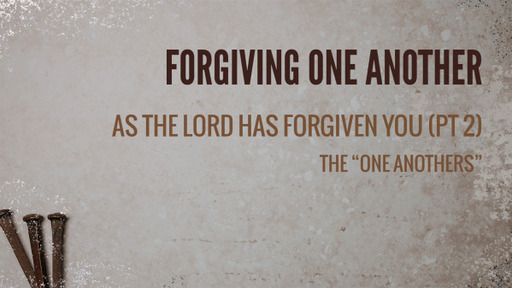Forgiving One Another As the Lord Has Forgiven You (Pt 2)

I. We must forgive one another graciously
A. Forgiveness requires grace because it is the forgiving person who pays the price of forgiveness
B. Forgiveness requires grace because our offer of forgiveness must be unconditional
II. Forgiving one another involves a commitment
By making and keeping these promises, you can tear down the walls that stand between you and your offender. You promise not to dwell on or brood over the problem or to punish by holding the person at a distance. You clear the way for your relationship to develop unhindered by memories of past wrongs. This is exactly what God does for us, and it is what he calls us to do for others.
III. Forgiving one another requires repentance
Think of it this way. Christians are called to offer a present to those who have hurt them. That package should be wrapped and tied with ribbon, with a tag addressed, “To you, regardless of what you’ve done.” Forgiveness is what is found inside if the offender chooses to open the package.
IV. Forgiving one another is inextricably linked to reconciliation
The assumption today seems to be that you can forgive someone but not be reconciled to them. This would be like leaving the gift on their doorstep, ringing the bell, and driving away, never to return. But remember our foundational principle: we are to forgive others as God forgave us. And God never forgives anyone without being reconciled to them.
V. Forgiving one another does not mean the elimination of all consequences
Consequences are important for the sake of justice. A willingness to accept consequences for sinful behavior is actually good evidence that the offender truly is repentant.
Forgiveness: A commitment by the offended to pardon graciously the repentant from moral liability and to be reconciled to that person, although not all consequences are necessarily eliminated.
Let me answer that question in three parts. First, as I have stressed, forgiveness does not mean the elimination of all consequences. Certainly in a case like a violent sex crime, part of the consequences would be that the rapist would have limited access to the victim.
Second, a Christian victim must be willing to forgive a repentant rapist graciously. I flinch even in writing that. I have no idea what it would be like to suffer in that way. Yet Christians are called to forgive others the way God forgives them. In a case like this, the victim might communicate to a repentant rapist through a letter or through a supervised meeting. If you are a Christian, always remember this: whatever someone has done to offend you pales in comparison to what you have done to offend a holy God.
Third, if the rapist were to become a Christian, or if both parties are Christians, there is the hope of heaven. And in heaven all relationships with God’s people will be completely and totally restored.
Here it is: Christians are to forgive others as God forgave them. Graciously, willingly, and freely, they should offer a costly present to any who offend them. Those who do repent and unwrap the offered package will find forgiveness and reconciliation inside.